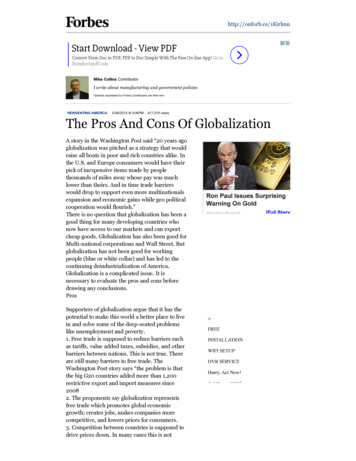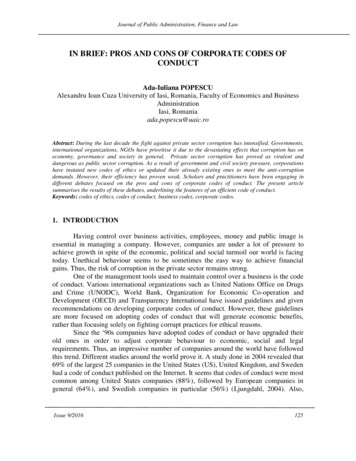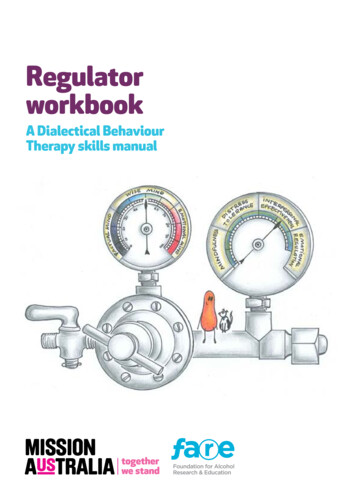
Transcription
http://onforb.es/1KirlmnStart Download - View PDFConvert From Doc to PDF, PDF to Doc Simply With The Free On-line App! Go tofromdoctopdf.comMike Collins ContributorI write about manufacturing and government policiesOpinions expressed by Forbes Contributors are their own.REINVENTING AMERICA5/06/2015 @ 3:06PM477,319 viewsThe Pros And Cons Of GlobalizationA story in the Washington Post said “20 years agoglobalization was pitched as a strategy that wouldraise all boats in poor and rich countries alike. Inthe U.S. and Europe consumers would have theirpick of inexpensive items made by peoplethousands of miles away whose pay was muchlower than theirs. And in time trade barrierswould drop to support even more multinationalsexpansion and economic gains while geo politicalcooperation would flourish.”There is no question that globalization has been agood thing for many developing countries whonow have access to our markets and can exportcheap goods. Globalization has also been good forMulti-national corporations and Wall Street. Butglobalization has not been good for workingpeople (blue or white collar) and has led to thecontinuing deindustrialization of America.Globalization is a complicated issue. It isnecessary to evaluate the pros and cons beforedrawing any conclusions.ProsSupporters of globalization argue that it has thepotential to make this world a better place to livein and solve some of the deep-seated problemslike unemployment and poverty.1. Free trade is supposed to reduce barriers suchas tariffs, value added taxes, subsidies, and otherbarriers between nations. This is not true. Thereare still many barriers to free trade. TheWashington Post story says “the problem is thatthe big G20 countries added more than 1,200restrictive export and import measures since20082. The proponents say globalization representsfree trade which promotes global economicgrowth; creates jobs, makes companies morecompetitive, and lowers prices for consumers.3. Competition between countries is supposed todrive prices down. In many cases this is not FREEINSTALLATIONWIFI SETUPDVR SERVICEHurry, Act Now!SAVEup to 2331
working because countries manipulate theircurrency to get a price advantage.4. It also provides poor countries, throughinfusions of foreign capital and technology, withthe chance to develop economically and byspreading prosperity, creates the conditions inwhich democracy and respect for human rightsmay flourish. This is an ethereal goal which hasn’tbeen achieved in most countries5. According to supporters globalization anddemocracy should go hand in hand. It should bepure business with no colonialist designs.6. There is now a worldwide market forcompanies and consumers who have access toproducts of different countries. True7. Gradually there is a world power that is beingcreated instead of compartmentalized powersectors. Politics is merging and decisions that arebeing taken are actually beneficial for people allover the world. This is simply a romanticized viewof what is actually happening. True8. There is more influx of information betweentwo countries, which do not have anything incommon between them. True9. There is cultural intermingling and eachcountry is learning more about other cultures.True10. Since we share financial interests,corporations and governments are trying to sortout ecological problems for each other. – True,they are talking more than trying.11. Socially we have become more open andtolerant towards each other and people who livein the other part of the world are not consideredaliens. True in many cases.12. Most people see speedy travel, masscommunications and quick dissemination ofinformation through the Internet as benefits ofglobalization. True13. Labor can move from country to country tomarket their skills. True, but this can causeproblems with the existing labor and downwardpressure on wages.14. Sharing technology with developing nationswill help them progress. True for small countriesbut stealing our technologies and IP have becomea big problem with our larger competitors likeChina.15. Transnational companies investing ininstalling plants in other countries provideemployment for the people in those countriesoften getting them out of poverty. True16. Globalization has given countries the ability toagree to free trade agreements like NAFTA, SouthKorea Korus, and The TPP. True but theseagreements have cost the U.S. many jobs andalways increase our trade deficitCons
The general complaint about globalization is thatit has made the rich richer while making thenon-rich poorer. “It is wonderful for managers,owners and investors, but hell on workers andnature.” Globalization is supposed to be about free tradewhere all barriers are eliminated but there are stillmany barriers. For instance161 countries havevalue added taxes (VATs) on imports which are ashigh as 21.6% in Europe. The U.S. does not haveVAT. The biggest problem for developed countries isthat jobs are lost and transferred to lower costcountries.” According to conservative estimates byRobert Scott of the Economic Policy Institute,granting China most favored nation statusdrained away 3.2 million jobs, including 2.4million manufacturing jobs. He pegs the netlosses due to our trade deficit with Japan ( 78.3billion in 2013) at 896,000 jobs, as well as anadditional 682,900 jobs from the Mexico –U.S.trade-deficit run-up from 1994 through 2010.” Workers in developed countries like the US facepay-cut demands from employers who threaten toexport jobs. This has created a culture of fear formany middle class workers who have littleleverage in this global game Large multi-national corporations have theability to exploit tax havens in other countries toavoid paying taxes. Multinational corporations are accused of socialinjustice, unfair working conditions (includingslave labor wages, living and working conditions),as well as lack of concern for environment,mismanagement of natural resources, andecological damage. Multinational corporations, which werepreviously restricted to commercial activities, areincreasingly influencing political decisions. Manythink there is a threat of corporations ruling theworld because they are gaining power, due toglobalization. Building products overseas in countries likeChina puts our technologies at risk of beingcopied or stolen, which is in fact happeningrapidly The anti-globalists also claim that globalizationis not working for the majority of the world.“During the most recent period of rapid growth inglobal trade and investment, 1960 to 1998,inequality worsened both internationally andwithin countries. The UN Development Programreports that the richest 20 percent of the world’spopulation consume 86 percent of the world’sresources while the poorest 80 percent consumejust 14 percent. “ Some experts think that globalization is alsoleading to the incursion of communicable
diseases. Deadly diseases like HIV/AIDS are beingspread by travelers to the remotest corners of theglobe. Globalization has led to exploitation of labor.Prisoners and child workers are used to work ininhumane conditions. Safety standards areignored to produce cheap goods. There is also anincrease in human trafficking. Social welfare schemes or “safety nets” are undergreat pressure in developed countries because ofdeficits, job losses, and other economicramifications of globalization.Globalization is an economic tsunami that issweeping the planet. We can’t stop it but there aremany things we can do to slow it down and makeit more equitable.What is missing?Leadership – We need politicians who are willingto confront the cheaters. One of our biggestproblems is that 7 of our trading partnersmanipulate their currencies to gain unfair priceadvantage which increases their exports anddecreases their imports. This is illegal under WTOrules so there is a sound legal basis to put somekind of tax on their exports until they quitcheating.Balanced Trade – Most of our trading partnerscan balance their trade budgets and even run asurplus. We have not made any effort to balanceour trade budget and have run a deficit for morethan 30 years resulting in an 11 trillion deficit.The trade deficit is the single biggest job killer inour economy, particularly manufacturing jobs. Weneed the government to develop a plan to begin tobalance our trade deficit even though this is not apolitical priority in either party.Trade Agreements – Both the NAFTA and theSouth Korean Korus trade agreements might havebeen good for Wall Street and the multi-nationalcorporations but they eliminated jobs in Americaand expanded our trade deficit. The upcomingTrans Pacific Trade Agreement will do the samething and Congress should not fast track this badagreement for a dozen reasons.Enforcing the rules – China ignores trade rulesand WTO laws with reckless abandon. Besidescurrency manipulation they subsidize their stateowned companies to target our markets, andprovide funding to their state owned companiesthat dump their products in America. They alsosteal our technologies, sell counterfeit versions ofour products, and impose tariffs and otherbarriers anytime they want – as we do nothing tostop them. China does not deserve to be on ourmost favored nation list and we need to tax theirexports to us until they stop these illegal activities.What is good for third world countries, like
Kenya, or countries with tremendous growth, likeChina, has not been good for American workers.Globalization is deindustrializing America as wecontinue to outsource both manufacturing bluecollar and white collar jobs. Supporters ofglobalization have made the case that it is goodbecause it has brought low priced imported goods,but they have not matched the decline of wages inthe middle class and will not offset the loss ofmany family wage jobsGlobalization is like being overwhelmed by a snowavalanche. You can’t stop it – you can only swimin the snow and hope to stay on top. I would liketo make the argument that the US should try a lotharder to swim in the snow and stay on top. Wecan’t stop globalization but there are manypolicies and strategies we can use to make it moreequitable. We can enforce the trade laws, force thecompetition to play by the same rules, and stopgiving our competitors the tools (technology andR& D) to ultimately win the global war.Mike Collins is the author of Saving AmericanManufacturing. His website is www.mpcmgt.com.RECOMMENDED BY FORBESThe Richest Person In Every StateThis Gmail Phishing Attack Is Fooling Even SavvyUsersThis article is available online at: http://onforb.es/1Kirlmn2017 Forbes.com LLC All Rights Reserved
necessary to evaluate the pros and cons before drawing any conclusions. Pros Supporters of globalization argue that it has the potential to make this world a better place to live in and solve some of the deep-seated problems like unemployment and poverty. 1. Free trade is supposed to reduce barriers such as tariffs, value added taxes, subsidies .










